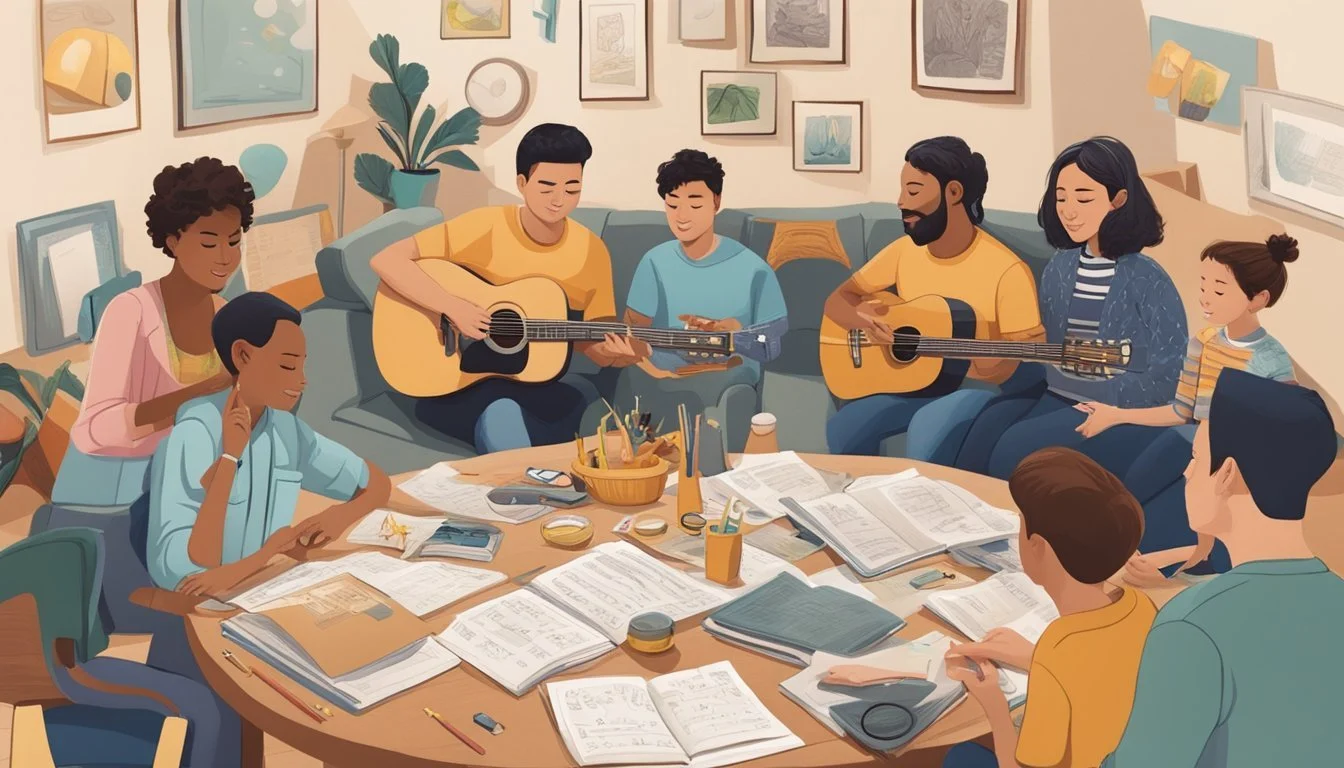7 Lessons on Songwriting from Willie Nelson & Family
Crafting Timeless Melodies
Willie Nelson, the iconic country music legend, has been captivating audiences for decades with his distinctive voice and songwriting prowess. At 90 years old, he continues to tour and release music, solidifying his status as a living legend. The new docuseries "Willie Nelson & Family" on Paramount+ offers viewers an intimate look into the artist's remarkable journey and songwriting secrets.
The series provides valuable insights into Nelson's creative process and the life experiences that have shaped his music. From his early days as a struggling musician to his rise as a country music icon, Nelson's story is one of perseverance, creativity, and passion for songwriting. Aspiring songwriters and music enthusiasts alike can glean important lessons from Nelson's approach to crafting memorable tunes and lyrics.
1) "Writing from the Heart is the Key to Authenticity" - Willie Nelson
Willie Nelson's songwriting philosophy centers on authenticity and emotional honesty. He believes that the most powerful songs come from personal experiences and genuine feelings.
Nelson encourages writers to tap into their own lives for inspiration. By drawing from real emotions and events, songwriters can create music that resonates deeply with listeners.
The country legend emphasizes the importance of staying true to oneself in the creative process. He advises against chasing trends or trying to imitate others' styles.
Nelson's approach involves writing about topics that matter to him personally. This method has led to the creation of timeless classics like "Crazy" and "On the Road Again."
By focusing on heartfelt expression, Nelson has cultivated a unique voice in the music industry. His songs often reflect his values, relationships, and life journey.
The singer-songwriter's success demonstrates the enduring appeal of authentic storytelling in music. His ability to connect with audiences through honest lyrics has contributed to his longevity in the industry.
2) Collaborate with Family for Unique Perspectives
Willie Nelson's approach to songwriting often involves collaboration with family members. This practice brings fresh ideas and diverse viewpoints to his music.
Nelson frequently writes songs with his sister Bobbie, who plays piano in his band. Their lifelong musical partnership has produced numerous hits and fan favorites.
His children, including Lukas and Micah Nelson, have also contributed to his songwriting process. These collaborations blend generational perspectives and musical styles.
Family co-writing sessions create an intimate, trusting environment where ideas flow freely. This atmosphere allows for honest feedback and creative risk-taking.
Nelson's family collaborations extend beyond immediate relatives to his band members, whom he considers extended family. This inclusive approach fosters a supportive creative community.
By drawing inspiration from family experiences and memories, Nelson infuses his songs with authenticity and emotional depth. These personal touches resonate strongly with listeners.
3) Embrace Imperfection in Your Lyrics
Willie Nelson's approach to songwriting often involves embracing imperfection in lyrics. He believes that flaws can add character and authenticity to a song. This mindset allows for a more natural and relatable expression of emotions and experiences.
Nelson's lyrics sometimes include unconventional phrasing or unexpected word choices. These quirks can make his songs more memorable and distinctive. He encourages songwriters to trust their instincts and not overthink every line.
Imperfect lyrics can also create a sense of vulnerability that resonates with listeners. Nelson's songs often feel raw and honest, partly due to his willingness to leave rough edges in his writing. This approach can help forge a stronger connection between the artist and the audience.
By accepting imperfections, songwriters can focus more on capturing the essence of their message rather than striving for technical perfection. Nelson's success demonstrates that listeners often respond more to the emotional truth of a song than to flawless craftsmanship.
4) Use Storytelling to Engage Listeners
Willie Nelson's songwriting often employs vivid storytelling to capture listeners' attention. His narratives paint detailed pictures and evoke strong emotions in his audience.
Nelson's songs frequently feature relatable characters and situations that resonate with people from all walks of life. He draws inspiration from personal experiences and observations, weaving them into compelling tales.
The country legend's storytelling approach extends beyond individual songs to entire albums. Concept albums like "Red Headed Stranger" demonstrate his ability to craft cohesive narratives across multiple tracks.
Nelson's storytelling techniques include using descriptive language, creating memorable characters, and incorporating dialogue into lyrics. These elements help listeners connect more deeply with the songs' messages and themes.
By focusing on universal themes like love, heartbreak, and perseverance, Nelson ensures his stories appeal to a wide audience. His ability to distill complex emotions into simple, powerful lyrics is a hallmark of his songwriting style.
5) Infuse Personal Experiences into Your Songs
Willie Nelson's songwriting prowess stems from his ability to draw from personal experiences. The "Willie Nelson & Family" docuseries showcases how he transforms life events into lyrical masterpieces.
Nelson's songs often reflect his own journey, relationships, and emotions. This authenticity resonates with listeners, creating a deep connection between artist and audience.
The legendary musician advises aspiring songwriters to mine their own lives for inspiration. By tapping into personal memories and feelings, writers can craft songs that feel genuine and relatable.
Nelson's hit "On the Road Again" exemplifies this approach. The song captures his love for touring and performing, drawing directly from his life as a traveling musician.
Incorporating personal experiences adds depth and sincerity to lyrics. It allows songwriters to tell stories that are uniquely their own, while still touching universal themes that listeners can identify with.
6) Explore Various Genres for Inspiration
Willie Nelson's musical journey exemplifies the power of exploring diverse genres. His songwriting draws inspiration from country, jazz, rock, and blues, creating a unique sound that transcends traditional boundaries.
Nelson's ability to blend different styles has contributed to his lasting appeal. By incorporating elements from various genres, he crafted songs that resonate with a wide audience.
This approach to songwriting encourages artists to listen broadly and experiment with different musical influences. It can lead to innovative compositions and help songwriters develop their own distinctive voice.
Exploring multiple genres can also prevent creative stagnation. It introduces new rhythms, melodies, and lyrical themes that can spark fresh ideas and approaches to songwriting.
Willie Nelson's genre-spanning catalog serves as a testament to the creative possibilities that arise from musical exploration. His work demonstrates how embracing diverse influences can enrich an artist's songwriting repertoire.
7) Keep Verses Simple but Meaningful
Willie Nelson's songwriting approach emphasizes simplicity and depth in verses. He crafts lyrics that are easy to understand yet carry profound messages.
Nelson's verses often use everyday language and relatable imagery. This makes his songs accessible to a wide audience while still conveying powerful emotions and ideas.
The songwriting legend believes in the power of brevity. He aims to express complex thoughts in concise ways, allowing listeners to connect with the core message quickly.
Nelson's verses frequently tell stories or paint vivid pictures with just a few carefully chosen words. This technique creates memorable lines that resonate with listeners long after the song ends.
By keeping verses simple, Nelson ensures that the melody and rhythm work harmoniously with the lyrics. This balance enhances the overall impact of his songs and makes them easier to sing along to.
The simplicity in Nelson's verses also leaves room for interpretation. Listeners can find personal meaning in his words, making the songs more relatable and timeless.
The Art of Storytelling in Willie Nelson's Lyrics
Willie Nelson's lyrics paint vivid pictures and tell compelling stories. His songs often feature relatable characters and situations that resonate with listeners. Nelson's ability to craft narratives through music has been a hallmark of his long and successful career.
Many of Nelson's songs unfold like miniature novels. They introduce characters, establish settings, and develop plot lines within just a few verses. This storytelling prowess is evident in classics like "Red Headed Stranger" and "Pancho and Lefty."
Nelson's lyrics frequently tap into universal themes:
Love and heartbreak
Life on the road
The struggles of everyday people
The passage of time
His words evoke strong emotions and create lasting impressions. Nelson's storytelling style is often straightforward yet poetic, allowing listeners to easily visualize the scenes he describes.
The songwriter's keen observational skills contribute to his lyrical authenticity. He draws inspiration from personal experiences and the world around him. This results in songs that feel genuine and relatable to audiences across generations.
Nelson's storytelling extends beyond individual songs. His concept albums, such as "Red Headed Stranger" and "Phases and Stages," weave intricate narratives across multiple tracks. These projects showcase his ability to sustain a story arc throughout an entire album.
Understanding Musical Composition
Willie Nelson's songwriting genius stems from his mastery of musical composition. His unique approach to chord progressions and melodic structures has shaped his distinctive sound over decades.
Exploring Chord Progressions Used by Willie Nelson
Willie Nelson often employs simple yet effective chord progressions in his songs. He frequently uses I-IV-V progressions, a staple in country and blues music. This creates a familiar, comfortable foundation for listeners.
Nelson also incorporates unexpected chord changes to add interest. In "Crazy," he uses a descending bassline to create tension and release. The song moves from C to C7 to F, then G7 to C, creating a circular feel.
His use of suspended chords adds depth to his compositions. In "On the Road Again," Nelson alternates between E and Esus4, giving the song its driving, open-road feel.
Melodic Structures in Classic Willie Nelson Songs
Nelson's melodies often feature wide intervallic leaps, creating memorable hooks. "Always on My Mind" opens with a striking octave jump, immediately grabbing the listener's attention.
He frequently uses pentatonic scales in his melodies, giving his songs a distinctly country flavor. "Blue Eyes Crying in the Rain" exemplifies this approach, with its simple yet emotionally powerful melody.
Nelson's phrasing is another key element of his melodic style. He often stretches or compresses phrases to fit the lyrics, creating a conversational feel. This is evident in "Whiskey River," where the melody follows the natural rhythm of speech.
His use of repetition in melodies helps make his songs catchy and singable. "On the Road Again" repeats its main melodic phrase, making it instantly recognizable and easy to remember.






